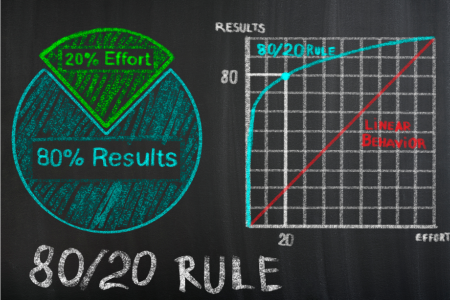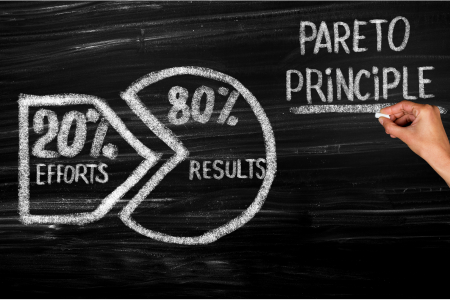
Also known as:
- The Pareto Principle
- The Principle of Least Effort
- The Principle of Imbalance
- The Law of the Vital Few and the Trivial Many
- The More with Less Principal
The Rule
The 80/20 Rule asserts that a minority of causes, inputs, or efforts usually lead to a majority of the results, outputs, or rewards. The 80/20 split is not hard-and-fast as to every situation. It's a scientific theory based on empirical data. The real percentages in certain situations can be 99/1 or an equal 50/50. They may not add up to 100. For example, only 2% of search engines hog 96% of the search-engine market. Fewer than 10% of drinkers account for over half of liquor sold. And less than .25% of mobile gamers are responsible for half of all gaming revenue.
Origin
In 1897, Vilfredo Pareto, an Italian economist, observed that 20% of pea pods in his garden produced 80% of the peas. He then applied the same logic to land distribution in Italy and found that 80% of the land was owned by 20% of the population. In 1949, George Zipf, an American economist at Harvard, rediscovered this rule after World War II. Then in 1979, British author, Richard Koch, wrote the best-selling book, The 80/20 Principle. This blog post captures some powerful content in his book.
The List of Examples
80% of a company's output is produced by 20% of its workers.
80% of social media shares are by 20% of posts.
80% of software glitches are caused by 20% of bugs.
80% of search visits involve 20% of keywords.
80% of promotions are given by 20% of bosses.
80% of budget overruns are caused by 20% of expenses.
80% of your success comes from 20% of your ideas.
80% of the public uses 20% of their computers' features.
80% of crimes are committed by 20% of criminals.
80% of sales are from 20% of clients.
80% of project value is achieved with the first 20% of effort.
80% of your knowledge is used 20% of the time.
80% of sales are produced by 20% of a company's products or services.
80% of stress is caused by 20% of stressors.
80% of rapid promotions are available in 20% of companies.
80% of customers' perceived value relates to 20% of an organization's work.
80% of the wealth is owned by 20% of the population.
80% of negotiation concessions occur in the last 20% of negotiations.
80% of the population finds only 20% of it attractive.
80% of sleep quality occurs in 20% of sleep.
80% of results are caused by 20% of thinking and planning.
80% of family problems are caused by 20% of issues.
80% of retail sales are produced by 20% of a store's brands.
80% of website traffic comes from 20% of content.
80% of opportunity is created by 20% of instigative impulses.
80% of new customers are generated by 20% of new offerings.
80% of muscle gain is built by 20% of the repetitions.
80% of complaints are by 20% of customers.
80% of a town's traffic is on 20% of its roads.
80% of innovation comes from 20% of the population.
80% of a product's costs involve 20% of its parts.
80% of software functionality is caused by 20% of the software developers' efforts.
80% of news coverage is based on 20% of world events.
80% of inventory comes from 20% of suppliers.
80% of your weekly tasks affect 20% of your future.
80% of grief is caused by 20% of people in your life.
80% of alarms will be set off by 20% of potential causes.
80% of the energy in a combustion engine produces 20% output.
80% of people marry within 20% of the local population.
80% of companies' absenteeism is caused by 20% of staff.
80% of investment gains are produced by 20% of investments.
80% of the benefit from any product or service can be provided at 20% of the cost.
80% of profits made by all industries are made by 20% of industries.
80% of profits made in any industry are made by 20% of firms.
80% of a market is supplied by 20% of suppliers.
80% of projects get completed in the last 20% of the time before a deadline.

![]()
The Inverse
20% of your wardrobe is worn 80% of the time.
20% of farmers produce 80% of the world's agriculture.
20% of your rug has 80% of the wear-and-tear.
20% of your phone apps get 80% usage.
20% of foods cause 80% of the weight gain.
20% of your TV channels are watched 80% of the time.
20% of the population implements 80% of their creative ideas.
20% of issues represent 80% of the materiality of the negotiations.
20% of your thoughts lead to 80% of ideas.
20% of your allies will help 80% of your success.
20% of companies that have achieved world-class status outsource 80% of their operations.
20% of words in a language account for 80% of usage.
20% of laws are broken 80% of the time.
20% of people in your life consume 80% of your time.
20% of planning causes 80% of a project's success.
20% of workers initiate a focus on issues that require 80% attention.
20% of your time leads to 80% of your happiness.
20% of work occupations cause 80% of workplace injuries.
20% of cities have 80% of the population.
20% of your social circle has 80% of its optimism.
20% of shareholders own 80% of a corporation's stock.
20% of a company's inventory consumes 80% of the space.
20% of your habits create 80% of your productivity.
20% of the population produces 80% of innovation.
20% of the foods you eat produce 80% of your energy.
20% of people produce 80% of innovation.
20% of cell phone users consume 80% of wireless bandwidth.
20% of your work tasks produce 80% of results for the day, month, or year.
20% of professional athletes cause 80% of ticket sales.
20% of your relationships consumed 80% of your dating life.
20% of your social circle provides you with 80% of the value.
20% of your friends produce 80% of inspiration.
20% of computer bugs fixed will stop 80% of crashes.
20% of the population causes 80% of car crashes.
20% of doctors, lawyers, and engineers commit 80% of malpractice.
20% of your experiences produce 80% of your happiness.
20% of the hours in a workday yield 80% of the productivity.
20% of bar liquor is consumed 80% of the time.
20% of the earth's inhabitants cause 80% of the world's problems.
20% of the population have 80% of the qualities you most want in a partner.
20% of companies cause 80% of the pollution.
20% of your project (first 10% and last 10%) will consume 80% of your attention.
20% of work hazards produce 80% of injuries.
20% of efforts in betting match 80% of the bettors.
20% of patients use 80% of health care resources.
20% of your knowledge is used 80% of the time.
20% of infected humans transmit 80% of the diseases.
20% of clothes packed in a suitcase are worn 80% of the time.
20% of newspapers are viewed 80% of the time.
20% of those who marry cause 80% of divorces.
20% of thieves make off with 80% of the loot.
20% of beer drinkers consume 80% of beer drunk.
20% of investment portfolios produce 80% of the gain.
20% of children will obtain 80% of the educational qualifications available.

35 Key Insights and Takeaways
- Life is nonlinear. Forces of life are imbalanced. Some forces are just more important.
- People who employ 80/20 thinking are good at achieving happiness.
- Effective 80/20 thinkers are masters at prioritizing and delegating the rest.
- Pick tasks with the highest reward that require the least effort.
- Life-changing insight requires consistent, high-value thinking and reflection.
- Solve problems by removing impediments, as the World Wide Web did by removing distance or as fast-food restaurants did by removing waiters.
- Laziness is a human trait and should be capitalized.
- Focus increases individuality, which is the essence of being a human being.
- Do more with less, not more with more.
- Never sacrifice time or love for money.
- Move quickly. Doubt, procrastination, and over-analysis sap energy.
- Focus on the value and disregard the waste. Resources that have weak effects should be ignored.
- Successful people identify value and adapt themselves to the world.
- Decisions based on superior economics always yield the highest returns.
- Convert your best talents into economic wealth.
- Capitalize on your "20% spike" of individuality to achieve rock-star success.
- Success is caused by steady application and sudden insight.
- Use this strategy to work 2 days per week with 60% more productivity.
- Disassociate effort from reward.
- Free your guilt.
- Practice spending your time unconventionally to arrive at what suits you perfectly.
- Enjoyment predicts success, not effort or education (although applying effort and education to what you enjoy will obviously catapult your success). For example, Ronald Reagan effortlessly moved from actor to president. He focused on what he felt passionate about (taxes, inflation, and communism). Warren Buffet's working style, admittedly, "borders on lethargy." He sits in his office and does what he loves.
- Go deeply and narrowly. Learn 99% of a topic and ignore the rest.
- Develop the facility to block out the bottom 80% mentally.
- Specialize in something that fills you with enthusiasm and passion.
- Act less. Action drives out thought, and it's the thought that directs meaningful action.
- Time management isn't the problem. We're awash in time. Time use is the problem. Most genius work is done in relatively little time.
- Achievement is driven by insight and selective action.
- Knowledge = power.
- Know your market.
- Become self-employed early.
- Employ net-value creators.
- Outsource everything that isn't within your core competencies.
- Leverage capital (both human and money).
- Learn from the best.
Applications of the 80/20 Principle for Life and Business
- Prioritization: By identifying the crucial 20% that yields 80% of the results, you can prioritize your efforts and resources for maximum impact.
- Efficiency: Applying the 80/20 Rule can help you streamline processes, eliminate waste, and focus on the most critical tasks, increasing efficiency.
- Decision-making: Understanding the principle can guide decision-making by focusing on the factors most influencing outcomes.
- Resource allocation: The 80/20 Rule can help optimize resource allocation by directing resources towards the most productive and profitable areas.
- Goal setting: Concentrating on the 20% of activities that generate the most significant results can help you set more effective and achievable goals.
- Problem-solving: Identifying the root causes of problems (the vital 20%) can lead to more targeted and efficient solutions.
- Time management: Applying the principle to time management can help you focus on the most important tasks and minimize time spent on less impactful activities.
- Relationships: The 80/20 Rule can be applied to relationships, helping you identify and nurture the most meaningful connections that contribute to your happiness and success.
- Personal development: You can accelerate personal growth and development by focusing on the 20% of skills, habits, or knowledge that yield the greatest benefits.
- Innovation: The principle suggests that a small percentage of ideas or innovations drive the majority of progress, encouraging a focus on high-impact initiatives.
A special thank you is owed to Richard Koch for dedicating his life to producing the incredible book that inspired this blog. The 80/20 Rule highlights life's imbalances, guiding us to prioritize for better results. These insights provide a path to efficiency and success.

